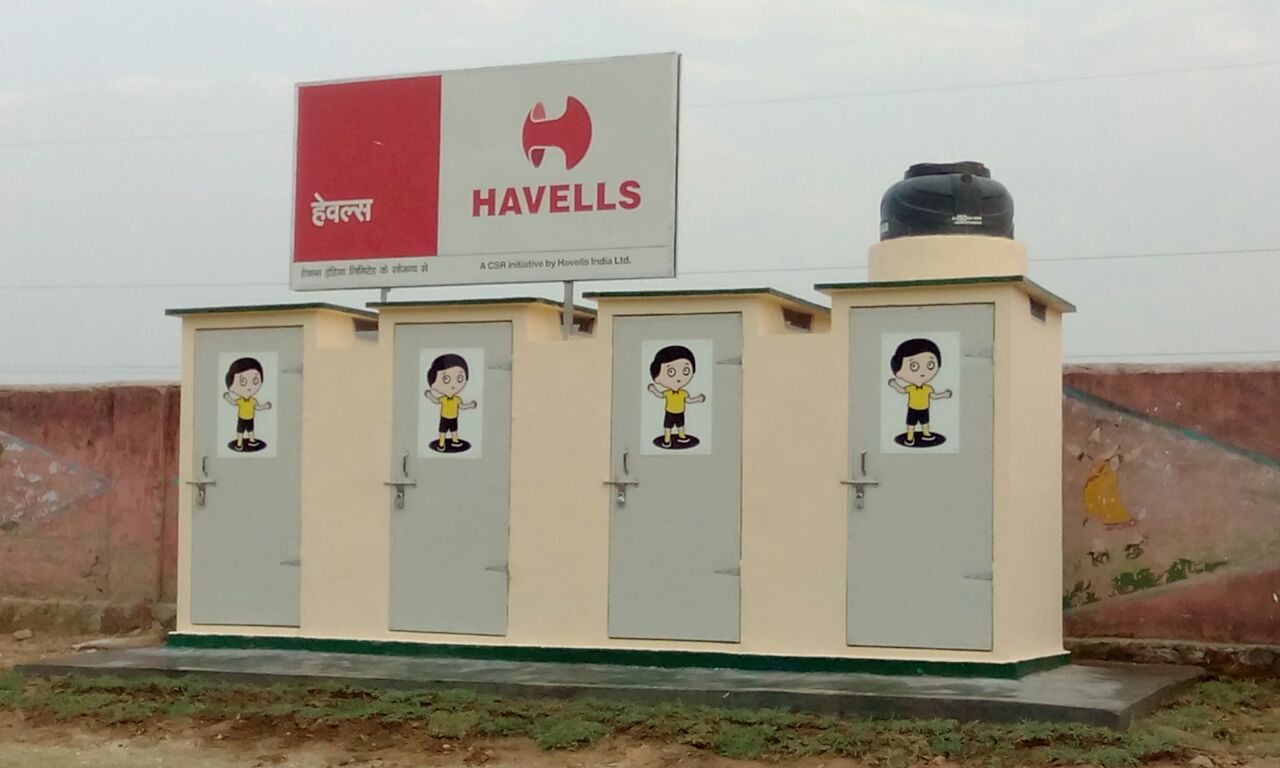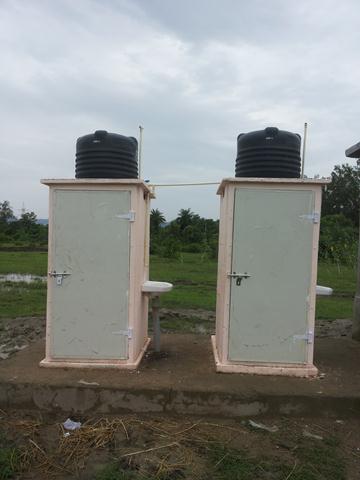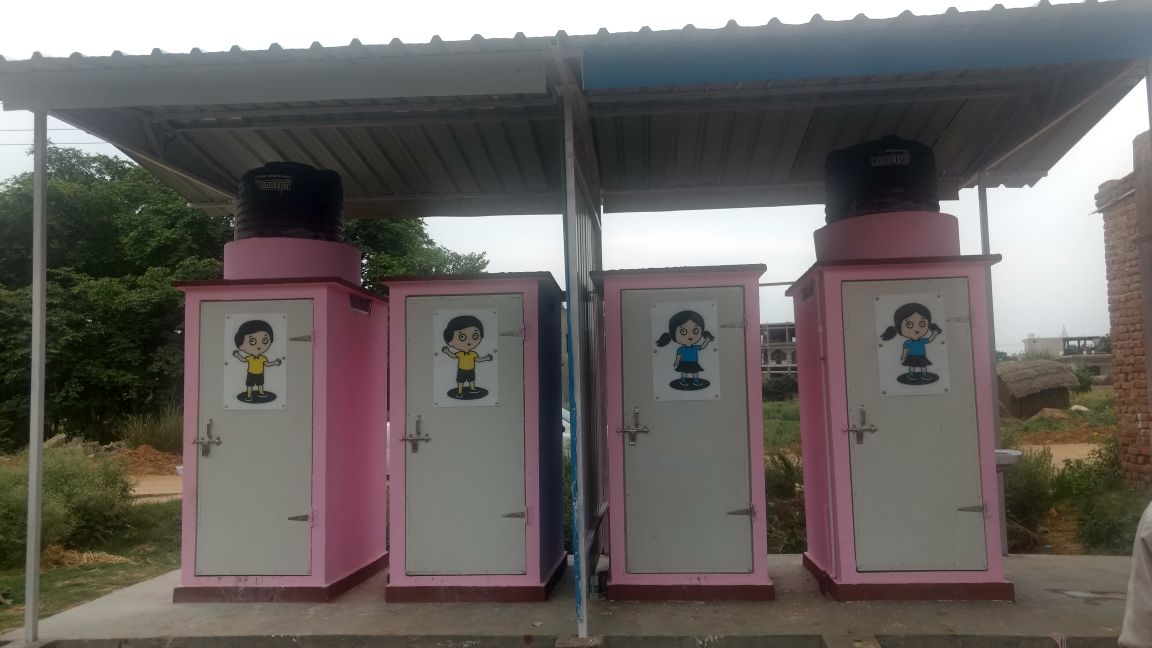Effective Water, Sanitation and Hygiene (WaSH) in Schools Leads to Completion of Education and Decreases Girls Dropouts Indian SME and Large Corporation Partnering in Support of Goals 6 and 4
Description
India has had the dubious distinction of having the highest number of people practicing open defecation, more so in the rural areas. Supporting the Swachh Bharat Abhiyan (Clean India Mission), initiated in 2014 and SDGs adopted in 2015 - Banka BioLoo, an SME in the WaSH sector and Havells, one of India's largest electrical equipment companies, formed a partnership to provide sanitation in schools in Alwar district of Rajasthan, in northern India. The companies, jointly, have been providing toilet blocks (for girls and boys, separately) with water and handwashing facility in 100 schools, for underprivileged children, every year since 2015.
Havells had already been supporting school education by providing nutrition in the form of mid-day meals to these underprivileged school children since 2005, as corporate social responsibility.<br />
Understanding a very strong nutrition-sanitation nexus, Havells was desirous of providing sanitation/WaSH facility in these schools. After evaluating various sanitation technology options, the Company decided to provide the environmentally-friendly and sustainable bio-toilets that are quick to install and treat waste onsite, in these schools. Havells chose to partner Banka BioLoo, a social enterprise of global acclaim that has bio-toilets at its heart, to install the bio-toilets (or bioloos) in the schools. <br />
<br />
This school sanitation program had multi-fold approaches, benefits and outreach. The bioloo is a sustainable sanitation solution – treating human waste onsite in a multi-chambered matriced bio-digester tank through bacteria inoculum. The innovative bioloo comprised precast ready-to-deploy toilet structures ensuring that the toilets were installed in a quick timeframe of one week, and factory-made bio-digester tanks. The production and installation of the bio-toilets in schools, while providing the much-needed WaSH facilities in schools, created significant employment opportunities for the local unskilled and semi-skilled workers, as also enhancing entrepreneurial options for local traders.<br />
<br />
The program/practice, with an SDG 6 (water and sanitation) focus, immensely supports Goal 4 (Education), and of course, incorporates SDG 16 (Partnerships to implement SDGs).<br />
<br />
Providing WaSH in schools ensures that the children attend their classes regularly, the girls benefit more as their privacy, security, safety is ensured and health & hygiene enhanced. The girl students don’t need to miss their classes during MHM, and don’t drop out of schools. Studies have been conducted to this effect by organizations and academicians.<br />
<br />
Since Havells had already been interacting with school staff and children through the mid-day meal program, and Banka BioLoo had experience in implementing school sanitation programs – the Alwar school sanitation project didn’t face hurdles or challenges. Officers from both the companies would meet the school staff and children and get a better sense of specific WaSH needs and incorporate the feedback in the implementation process. For instance, the height at which the boys’ urinals would be placed keeping in mind the average height of the boy students in the school.<br />
<br />
“Hardware†component of the practice was met through physical bioloos and the “software†element through awareness programs in the schools, coupled with literature distribution that the children would keep with them, and take home. This helped in the message of cleanliness and safe WaSH reaching the families and communities, as these school children became the new ambassadors of safe and clean water, sanitation and hygiene in their respective villages.
Havells has its largest production plant in Alwar, state of Rajasthan, northern India. The company has a deep commitment to the local community and their welfare. Among the various CSR initiatives in the area, the company provides nutrition and sanitation in several schools of the district, ensuring holistic education. More schools
After the school sanitation program was inked between Havells and Banka BioLoo in 2015, the latter set up a production unit in Alwar to manufacture the bioloos and deployed a team, which steadily grew and mainly includes local youth for production and installation of bioloos in schools. Every year 100 schools are sanitized, with 8 bioloos in each school – 4 for boys and 4 for girls. This number could be increased or decreased depending on the students’ population in the school.
Broad strategy of implementation was chalked out at the start of the program between the main stakeholders – Havells and Banka BioLoo. It included providing WaSH in the schools in which the mid-day meal program was ongoing. This ensured that a set of schools was already identified and available to implement, in the initial years of the program. The sample bioloo block was approved by Havells officers, in conjunction with school staff.
Every six months, the managers and officers from the two organizations meet to review the progress, understand feedback from school staff and students. Informal and formal meetings with school officials take place monthly. These meetings also help identify potential unserved schools, as also incorporate feedback from existing schools.
Project execution includes a brief survey among the schools where the program is to be implemented. This helps in need assessment and accordingly 4/8/12/16 bioloos are installed in the school depending on the student population. This is finalized between Havells, Banka BioLoo and school administration. Production of bioloo structures, bio-digester tanks and bacteria inoculum happens through the year. After the schools are identified, number of bioloos per school is finalized. Then the Banka BioLoo team takes the materials in lorries to the respective schools and bioloos are installed by the team. It’s a smooth process and all team members adhere to their duties and responsibilities ensuring that the school children get effective WaSH facilities for their daily needs.
Monitoring is through periodic feedback from the school, as well as visits by Havells and Banka BioLoo officers to the schools after the bioloos are installed.
The Alwar School Sanitation Program, too, has shown similar results. Children’s attendance has improved, and many parents have told the school authorities that the children are happier and healthier. The children are keen to come to school every day, and don’t wish to miss classes. The families, too, have gained from the overall environment of cleanliness and sanitation, including through the messages brought home by young students. For instance, many families that didn’t have toilets at home (India has had the highest rate of open defecation) began constructing one, as the children shared their bioloo experience at home.
The program hasn’t conducted any formal impact assessment study, and relies heavily on the regular interaction and feedback from all stakeholders and beneficiaries. The beauty of this program is that it doesn’t face hurdle, challenge or difficulty, and is thus a win-win project. The positive spill-over of the program is that more schools in the district look forward to having bioloos in their campus. School children, as ambassadors of water, sanitation and hygiene, carry the message of WaSH to their families and communities, triggering a multiplier effect.
These schools provide education to children from socially- and economically-disadvantaged sections of the society, hence providing WaSH facilities in these schools goes a long way in contributing to the philosophy of leave no-one behind. The impact is multi-fold – these children get healthier environment in school, they attend regularly, and as they complete education, are in a much better position to earn livelihood for themselves and their families.
India was, and is, understanding the benefits of cleanliness and sanitation – through the ongoing Clean India Mission as well as the force of SDGs. This, already, created a positive environment for the school sanitation program.
The program preferred the innovative bioloo as the sanitation solution to be implemented, in contrast to traditional systems. The bioloo deploys precast toilet that is quick- and easy-to-install and in a smaller timeframe compared to conventional construction method, usually undertaken. The bioloo uses a factory-made bio-digester tank to treat fecal waste onsite with the help of bacteria inoculum (the bacteria are to be put only once). This bio-digester technology obviates the need for excreta disposal, transport and treatment as a separate activity. This, again, ensured that the school administration didn’t have to bother about waste management issues such as pit emptying and transportation. And the school staff strongly favoured it.
With strong support from all stakeholders, 3,200 bioloos have been installed in 400 schools in Alwar district since the start of the program / practice in 2015 (benefiting thousands of students); and continuing, to ensure that each and every school in the district has WaSH facility.
The main components of bioloos, such as the toilet structures, bio-digester tanks and bacteria inoculum, are manufactured and produced at the plant, from where these are transported to the respective schools and the teams install them. There is no dependence on external entities at the site, ensuring rapid and hassle-free implementation.
The bioloo is a sustainable sanitation solution, with environmentally-friendly waste treatment integrated. The costs are lower compared to traditional systems, and employs modern bio-digester technology to treat waste onsite. The solution is cost-effective as there is no expenditure for waste transportation and disposal after the bioloos are installed. The effluent water that comes out of the bio-digester tank can be used for gardening and similar purposes, or it seeps down to recharge the water table.
We have already implemented bioloos in hundreds of other schools in various states across India, partnering with other companies. The practice can be easily extended anywhere, as it can be implemented in any geographic terrain and climatic condition, with minor alteration.
It has been heart-warming to implement the practice/program, with a strong all-round impact on the lives of many, directly and indirectly.<br />
<br />
Providing WaSH facility at a school that didn’t have, ensures regular attendance in school and fewer dropouts, and the girl students being a bigger beneficiary, who suffer on count of safety, dignity, privacy and health due to absence of toilets and sanitation.<br />
The Alwar school program received acclaim and award from the Government of Rajasthan.<br />
<br />
The practice made students the ambassadors of cleanliness in their families and communities. They practised and carried message home.<br />
<br />
The practice gave a boost to the innovative WaSH solution, the bioloo. Today, not only is the bioloo installed in Alwar district but also across different states of India.<br />
The bioloo production and installation helps local economy through new job creations, entrepreneurial opportunities and builds an environment of sanitation.
The bioloos were selected as an innovative solution promoting SDGs for the first Solutions Summit in 2015, selected among 14 to present at the summit of 800+ nominations http://www.solutions-summit.org/
Government of Rajasthan, at its first-ever CSR Summit in 2017 honoured Havells with the newly-instituted CSR Awards of Excellence in the category of Clean Water and Sanitation https://indiasanitationcoalition.wordpress.com/2017/03/31/havells-honou…
An article by Sanjay Banka exemplifying the WaSH-nutrition nexus for children’s growth, published by WSSCC https://www.wsscc.org/2018/08/31/banka-bioloo-complementing-havellss-nu…
The Global Handwashing Partnership published the article by Sanjay Banka on the eve of HLPF 2018 wherein SDG 6 was under review https://globalhandwashing.org/supporting-education-through-sanitation-a…
An article in The Guardian hailing bioloo as one of the 5 global frugal innovations https://www.theguardian.com/business-call-to-action-partnerzone/2018/ap…
And many more …
SDGS & Targets
Deliverables & Timeline
Resources mobilized
Partnership Progress
| Name | Description |
|---|
Feedback
Action Network


Timeline
Entity
Region
- Asia and Pacific
Geographical coverage
Photos



Website/More information
Countries
Contact Information
Sanjay Banka, Director
